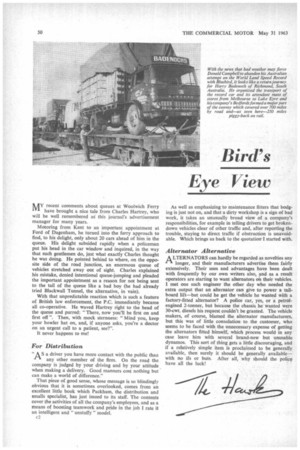• Bird's Eye View
Page 52

If you've noticed an error in this article please click here to report it so we can fix it.
MY recent comments about queues at Woolwich Ferry have brought a nice tale from Charles Hartrey, who will be well remembered as this journal's advertisement manager for many years.
Motoring from Kent to an important appointment at Ford of Dagenham, he turned into the ferry approach to find, to his delight, only about 20 cars ahead of him in the queue. His delight subsided rapidly when a policeman put his head in the car window and inquired, in the way that such gentlemen do, just what exactly Charles thought he was doing. He pointed behind to where, on the opposite side of the road junction, an enormous queue of vehicles stretched away out of sight. Charles explained his mistake, denied intentional queue-jumping and pleaded the important appointment as a reason for not being sent to the tail of the queue like a bad boy. (he had already tried Blackwall Tunnel, the alternative, in vain).
With that unpredictable reaction which is such a feature of British law enforcement, the P.C. immediately became all co-operative. He waved Hartrey right to the head of the queue and purred: "There, now you'll be first on and first off ". Then, with mock sternness: "Mind you, keep your bowler hat on, and, if anyone asks, you're a doctor on an urgent call to a patient, see?".
It never happens to me!
For Distribution
"AS a driver you have more contact with the public than any other member of the firm. On the road the company is judged by your driving and by your attitude when making a delivery. Good manners cost nothing but can make a world of difference."
That piece of good sense, whose message is so blindingly obvious that it is sometimes overlooked, comes from an excellent little book which Packham, the distribution and smalls specialist, has just issued to its staff. The contents cover the activities of all the company's employees, and as a means of boosting teamwork and pride in the job I rate it an intelligent and " unstuffy " model. As well as emphasizing to maintenance fitters that bodging is just not on, and that a dirty workshop is a sign of bad work, it takes an unusually broad view of a company's responsibilities, for example in telling drivers to get brokendown vehicles clear of other traffic and, after reporting the trouble, staying to direct traffic if obstruction is unavoidable. Which brings us back to the quotation-I started with.
Alternator Alternative
A LTERNATORS can hardly be regarded as novelties any 1Th longer, and their manufacturers advertise them fairly extensively. Their uses and advantages have been dealt with frequently by our own writers also, and as a result operators are starting to want alternators on their vehicles. I met one such engineer the other day who needed the extra output that an alternator can give to power a tailboard lift—but could he get the vehicle he wanted with a factory-fitted alternator? A police car, yes, or a petrolengined 2-tonner, but because the chassis he wanted were 30-cwt. diesels his request couldn't be granted. The vehicle makers, of course, blamed the alternator manufacturers, but this was of little consolation to the customer, who seems to be faced with the unnecessary expense of getting the alternators fitted himself, which process would in any case leave him with several brand-new but unusable dynamos. This sort of thing gets a little discouraging, and if a relatively simple item is proclaimed to be generally available, then surely it should be generally available— with no ifs or buts. After all, why should the police have all the luck!












































































































